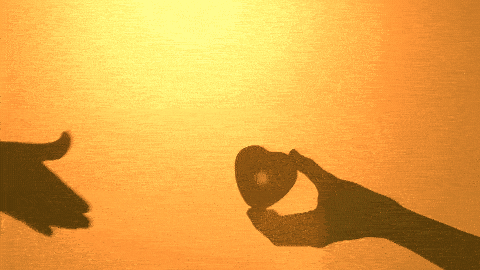READ TIME: 11m
DR JOHN DEMARTINI - Updated 1 year ago
When it comes to your relationship, do you perceive that you are the “underdog” or the “overdog”? Or are you in a state of equanimity and equity and have fair exchange with the individual that you care about and are in a relationship with?
In many cases, people become infatuated with others, perhaps because of their perceived attractiveness, intelligence, business savvy, wealth, social skills, stability for marriage, or perhaps because of how inspired they are about their life. Everyone, believe it or not, is looking for the greatest and most empowered package they can get out there.
Say, for example, you meet someone you perceive to be an amazing catch and you become infatuated with them or conscious of their upsides and unconscious of their downsides. As such, you’ll likely play the UNDERDOG in relation to them.
When you’re the underdog, you'll tend to sacrifice yourself for them. As such, you’ll likely start doing things you don't normally do to try to fit into their life because you fear losing them. You’ll be walking on eggshells trying to please them, sacrificing what’s important to you for what’s important to them.
Anything you become highly infatuated with; you will fear the loss of.
So, you'll readily sacrifice what's important to you to keep that relationship going.
Those individuals will eventually let you know in one way or another that you're minimizing yourself because deep down, they don’t want that – they want someone who is an equal – a match.
As the underdog, you're likely to look for monogamy and believe you’ve found “the one”. The overdog, on the other hand, tends to keep their options open because they subconsciously know they don't really have a matching mate and don’t fully respect the relationship.
You're afraid of saying anything negative because you fear losing them; and they're afraid of saying something positive for fear of misleading you because they intuitively know that this isn't a long-term relationship; it's not quite a match due to the imbalance of powers, but it may be convenient for now. This creates a type of incestual dynamic where you're playing the juvenile child-like dependent and they the precociously independent parent-like individual.
My advice if you’d love to be in a lasting and more stable relationship is not to try to marry someone you perceive as being significantly above you, thinking, "I better hurry up and grab them."
You will not be able to remain playing in the underdog position because you will eventually become resentful at some stage and crack the fantasy of who they are. Time will do that because, as the underdog, you'll gradually accumulate resentments until you speak up and try to bring your exchange fairly into balance. If the relationship becomes more balanced and they remain there, they will develop more respect for you because you respect yourself, which is a wiser and more fulfilling dynamic.

If you want to come back from playing the underdog, it is wise to introspect and discover WHY you're playing the underdog.
It is because you're too humble to admit that what you see in them is already inside you, and you perceive they have something that you don't.
You can own all the traits – nothing is missing in you. As it says in Romans 2:1, whatever you judge in others, you do. However, sometimes you are too proud or too humble to admit that what you see in them is also inside you.
To bring yourself and the relationship back into equilibrium and equanimity, it is wise to identify exactly what it is that you admire about them and itemize each trait in a list.
You can then ask yourself, "Go to a moment where and when I perceive myself displaying or demonstrating the same behavior." In other words, identify where you have the equivalent behavior. It may be in a slightly different form because of your unique set of values but if you take the time and do the work, you can become conscious of where you display those same traits.
If you can see that everything you see in them is in you, you can level the playing field. In other words, you can become less likely to sacrifice altruistically for them and more likely to stand up for yourself and have a more sustainable fair exchange.
When you do, you’ll tend to find that there’s banter. If you're afraid to say negative things because you're the underdog, they likely don't respect you because you’re not respecting yourself. But if you're able to banter with them and say positive and negative things equally to keep them in check, they’re likely drawn to you because they have finally found someone to help keep them authentic.
They, like you, want to be loved for who they are, and their authentic self is who they are. But if you've put them on a pedestal, they consciously or unconsciously know that's not who they are. Instead, they will be looking for someone to keep them in check, to help them get back to being who they truly are.
People don't want to be put on pedestals or in pits. They want to be put in hearts.
So, if you put them on a pedestal and minimize yourself, playing the underdog, it is wise to identify exactly where what you see in them is inside you.

I had a very interesting case about 30 years ago when I was out in San Diego speaking to a Mary Kay cosmetic group with hundreds of women attendees, many of whom wanted a private consult after the event ended.
One young lady came to me and said, "Dr. Demartini, I really would love your feedback and advice on this. I've met this guy and I just know he's the one. He's amazing, he's everything I've ever wanted. Should I marry him?" I responded, "Well, if you're asking the question, you're obviously not certain - there's a part of you that's hesitating. Here's my recommendation: go sit over there and write down everything you ADMIRE about this guy. Make sure it's an exhaustive list."
So, she went and wrote down everything she admired about him. She came back with a list of 78 admired traits. I said, "Great. Now, I want you to write down the same number of things you DISLIKE about him."
She looked a little confused and responded, "I don't have that many." I said, "Then you have a fantasy about who this guy is. Go make a list of all the things you dislike about him. When the list of dislikes matches the list of likes, you'll have a real understanding of who this individual is – otherwise you are blinded by a degree of infatuation."
She went to work on this next task and came back saying, "Wow, I can now see that there were sides of him that I didn’t want to look at, probably because of my childhood. When I was growing up, my parents fought a lot and used to yell at each other about the things they didn’t like. I was determined not to have a relationship like that so deep down I probably made a subconscious decision to only see the positives."
I asked her if she could now see both the positives and negatives equally, and she replied that she could and that she loved him. I told her, "That's a wiser and healthier state than when you started."
Next, I asked her to find out where and when SHE displayed each of the 78 traits she LIKED about him. I wanted her to see that she had the same behaviors so she would be less likely to feel that she desperately needed him and could instead choose to be with him. She went and worked on this task, and I noticed from a distance that she was crying as she became conscious of having these same traits. I could see that she was calming down her infatuation with him.
When she came back, she asked, "Do I need to go find out the other side too?" I said, "Yes, now go and identify where you have each of those traits you DISLIKE in him."
After a while, she returned, before heading off on her final task to find the drawbacks of the traits she admired and the benefits of the traits she disliked.
By six o’clock in the evening, she had spent most of the day there. I asked, "Now when you think about this guy, what do you think?" She said, "I still love him." I asked, "Can you see you have everything you see in him?" She replied, "Yes, I have it in my own way." I asked, "Do you now see him as an equal?" She said, "Yes, I do. I feel like I can actually be myself around him now – that I can speak up without worrying about upsetting him."
I then went back to her original question that she first asked me about whether or not she should marry him. She smiled and said that she was now certain that he was the guy for her and that she wanted to marry him.

I ended by explaining to her that, "The reason I did this exercise was to help you discover that YOU have the power to make that decision by yourself. I didn't want you to rely on me, because if it didn’t work out, you’d tend to blame me and look for another infatuation. I wanted you to truly love the individual for both sides because everyone wants to be loved for both sides. You do too."
She had tears in her eyes, gave me a big hug, and said, "Thank you. That was not what I expected today, but it's what I needed."
To end off, I’d like to remind you that if you're in an underdog position and sacrificing for someone else, it often means pushing aside what’s important to YOU to do what’s important to THEM. It’s wiser to communicate what you want in terms of what they want, without sacrificing yourself completely. Minimizing yourself as an underdog simply won’t work long-term.
Whether you perceive yourself as an underdog or overdog, it is wise to own all the traits and acknowledge that what you see in them is inside you. In that way, you can empower yourself and your relationship to thrive on mutual respect, true dialogue and communication. In that way, you are less likely to put others or yourself on pedestals or in pits, and instead put them in your heart where you are able to truly love them for their authentic self.
To Sum Up
If you are inspired to come back from being the underdog, here is a reminder about a few key steps you can take:
Find what you see in them inside yourself. As I mentioned above, you own all the traits, so it is wise to identify what you see in them in you. At the level of the essence of your authentic self, nothing is missing. However, at the level of the existence of your senses, things appear to be missing. These perceived lacks are because you are too proud or too humble to admit that what they have, you have.
Level the playing field by identifying the drawbacks of all the positive behaviors you're infatuated with. And find the benefits of their negative traits or behaviors because the traits you admire have downsides, and the traits you despise have upsides. Recognizing this helps you become more authentic and empowered in your own life.
Playing superior or inferior often creates volatility in relationships instead of stability. It is wiser to bring balance and equilibrium to the relationship so you can perceive each other as equals and can have sustainable fair exchange.
Take the time to find out what they value most, as their ontological identity and purpose revolve around their highest values. If you can’t see how their values support yours and vice versa, you’ll tend to have an alternating monologue instead of true communication. But if you can see how your highest values help them fulfill their highest values support yours, you are more likely to have dialogue and communication more than alternating monologue. And the key to a healthy relationship is dialogue and communication.
It isn’t wise to rush into marriage with someone you see as a fantasy, which often results in you making sacrifices for them and resulting resentment down the line. It is wiser to take the time to become conscious of their positive and negative traits so you have equilibrium, equanimity and authenticity in your relationship.
These are the tools I teach in my signature 2-day Breakthrough Experience program. Every week, I help people stabilize a relationship, empower themselves, and empower all seven areas of their lives.
A relationship thrives when both partners are intelligent, fit, ambitious, financially resourceful, loving, socially savvy, and inspired. So, the more areas of life you empower, the more valuable you are and the more likely you are to manage any relationship challenges. Come to the Breakthrough Experience so I can give you the tools to help you empower all your relationships and all seven areas of your life.
If you’d love to find out more about values click here.
Are you ready for the NEXT STEP?
If you’re seriously committed to your own growth, if you’re ready to make a change now and you’d love some help doing so, then click on the LIVE chat button bottom right of your screen and chat to us now.
Alternatively, you can book a FREE Discovery call with a member of the Demartini Team.
Interested in the Breakthrough Experience seminar?
If you’re ready to go inwards and do the work that will clear your blockages, clarify your vision and balance your mind, then you’ve found the perfect place to start with Dr Demartini at the Breakthrough Experience.
In 2 days you’ll learn how to solve any issue you are facing and reset the course of your life for greater achievement and fulfillment.
Click HERE to find out more
Important Notice:
The content shared in this blog is for education and personal development. It is not intended to diagnose, treat, cure, or prevent any psychological or medical conditions. The information and processes shared are for general educational purposes only and should not be considered a substitute for professional mental-health or medical advice. If you are experiencing acute distress or ongoing clinical concerns, please consult a licensed health-care provider.
Read full disclaimer HERE









